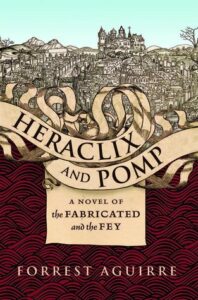 Heraclix and Pomp, Forrest Aguire
Heraclix and Pomp, Forrest Aguire
This book turned out to be pretty strongly not for me. It’s not the plot that bothers me: that’s fairly standard as it goes. A fabricated golem and a fairy are thrown together by circumstances and end up journeying together to discover more about the golem’s past. He’s a bit of a Frankenstein’s monster, more than a golem, made of the flesh of various people with various powers, so he ends up tracking down the various parts of himself to learn what happened. There’s a big bad who wants to be immortal, and then there’s also trips to hell, capture by brigands, etc.
What I disliked was something about the narration. There was a certain “and then this happened, and this happened, and this person said this, and then another thing happened”. I never had a strong sense of causal links between things, or what things could lead to. It actually had a flavour something like a translation of a Russian novel for me — some sense that the storytelling doesn’t quite come from the same tradition (though I don’t think it does? I mean, this is just my sense of how the story “felt”). In this case, it just proved really not to my taste; I ended up skimming a lot, and I definitely didn’t get emotionally involved in the story or care much about how it might end.

It’s always a pain getting that disappointing novel. It had sounded a bit different and interesting so it’s a shame it didn’t work for you.
It didn’t feel that different to me, to be honest, but I read a lot of fantasy!
That’s too bad – that narration was what I liked best about the book. It felt like a ‘lost’ work of 18th century, and that pulled me in.
Bob @ She Leads he Reads recently posted…Book Review: The Name of All Things by Jenn Lyons
Oof, I really wouldn’t say 18th century. Not really my period, of course, but that’d be contemporaneous with Moll Flanders, Robinson Crusoe and such. Based on that style, definitely not 18th century, though IIRC Swift was 18th century too, and maybe that has more parallels — can’t stand Swift, so never read more than I had to. (Not that I enjoy Defoe, either, but I’ve studied Moll Flanders and so necessarily know it inside and out.)